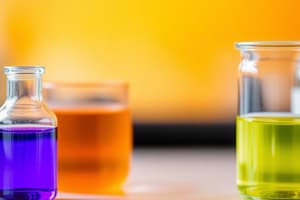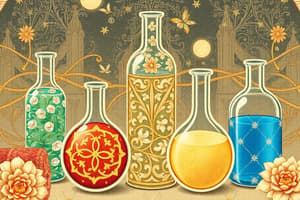Podcast
Questions and Answers
What type of mixture consists of materials that are evenly distributed throughout and maintain the same composition?
What type of mixture consists of materials that are evenly distributed throughout and maintain the same composition?
- Homogeneous Mixture (correct)
- Element
- Heterogeneous Mixture
- Compound
Which of the following is an example of a heterogeneous mixture?
Which of the following is an example of a heterogeneous mixture?
- Oil and water (correct)
- Catsup
- Milk
- Soy sauce
Which property of matter does not depend on the amount of substance present?
Which property of matter does not depend on the amount of substance present?
- Boiling point (correct)
- Weight
- Mass
- Volume
What type of change occurs when matter changes its composition and forms a new product?
What type of change occurs when matter changes its composition and forms a new product?
Which of the following is not considered a physical property of matter?
Which of the following is not considered a physical property of matter?
What happens to the molecules in a gas compared to a solid?
What happens to the molecules in a gas compared to a solid?
Which law states that the mass of reactants must equal the mass of products in a chemical reaction?
Which law states that the mass of reactants must equal the mass of products in a chemical reaction?
Which of the following is an example of a physical change?
Which of the following is an example of a physical change?
What defines a pure substance in chemistry?
What defines a pure substance in chemistry?
Which of the following statements about elements is NOT true?
Which of the following statements about elements is NOT true?
Which type of matter can be classified as a mixture?
Which type of matter can be classified as a mixture?
Which of the following is an example of a compound?
Which of the following is an example of a compound?
What characteristic differentiates metals from non-metals?
What characteristic differentiates metals from non-metals?
Which type of compound is formed from the combination of hydrogen ions and non-metals?
Which type of compound is formed from the combination of hydrogen ions and non-metals?
Which of the following best describes metalloids?
Which of the following best describes metalloids?
Which of the following compounds is classified as a base?
Which of the following compounds is classified as a base?
Flashcards are hidden until you start studying
Study Notes
Chemistry Overview
- Chemistry studies matter, including its composition, properties, structures, and transformations.
- Matter is anything that occupies space and has mass.
- Mass quantifies matter in an object; weight measures the gravitational pull on that mass.
Classifications of Matter
- Matter is classified into two categories: pure substances and mixtures.
Pure Substances
-
Elements:
- Comprise single atoms, cannot be simplified further.
- Unique properties; 118 known elements, with 92 occurring naturally.
- Represented by symbols (1 or 2 letters, first letter capitalized).
-
Compounds:
- Composed of elements in fixed ratios; original properties of elements are lost.
- Cannot be separated through physical methods, only chemical processes.
- Examples include:
- Carbon Dioxide (CO2)
- Magnesium Hydroxide (Mg(OH)2)
- Sucrose (C12H22O11)
- Hydrochloric Acid (HCl)
Types of Elements
-
Metals:
- Most are solid at room temperature (except Hg).
- Good conductors of heat and electricity; malleable and ductile.
-
Non-metals:
- Poor conductors; not malleable or ductile.
-
Metalloids:
- Exhibit properties of both metals and non-metals.
- Also known as semiconductors; conduct electricity better than non-metals but worse than metals.
Kinds of Compounds
- Salts: Formed from a metal and a non-metal (e.g., MgCl2, KF).
- Acids: Combinations of hydrogen ions (H+) with non-metals or polyatomic ions (e.g., HCl, H2SO4).
- Bases: Comprise metals and hydroxide ions (OH-) (e.g., NaOH, Mg(OH)2).
- Organic Compounds: Mainly hydrocarbons (e.g., CH4, C2H6).
Mixtures
- Combinations of elements or compounds where individual properties remain.
- Can be separated by physical methods.
Types of Mixtures
-
Homogeneous Mixtures:
- Uniform composition; constituents are indistinguishable (e.g., milk, soy sauce).
-
Heterogeneous Mixtures:
- Non-uniform composition; different components can be identified (e.g., oil and water, salad).
Properties of Matter
-
Physical Properties:
- Observable characteristics (e.g., color, smell, mass, temperature).
-
Chemical Properties:
- Characteristics that lead to new product formation (e.g., flammability, oxidation).
Changes in Matter
-
Physical Changes:
- Alterations in physical attributes without changing composition (e.g., melting ice).
-
Chemical Changes:
- Result in the formation of new substances (e.g., burning wood).
Types of Physical Properties
-
Intensive Properties:
- Independent of the amount of substance (e.g., color, boiling point).
-
Extensive Properties:
- Dependent on the amount of substance (e.g., mass, volume).
Phases of Matter
-
Solid:
- Molecules tightly packed; has a fixed volume.
-
Liquid:
- Molecules are less dense; flows easily.
-
Gas:
- Molecules are widely spaced; fills the container.
Laws of Matter
- Law of Conservation of Mass:
- Mass is neither created nor destroyed in a chemical reaction; total mass of reactants equals total mass of products.
Studying That Suits You
Use AI to generate personalized quizzes and flashcards to suit your learning preferences.




